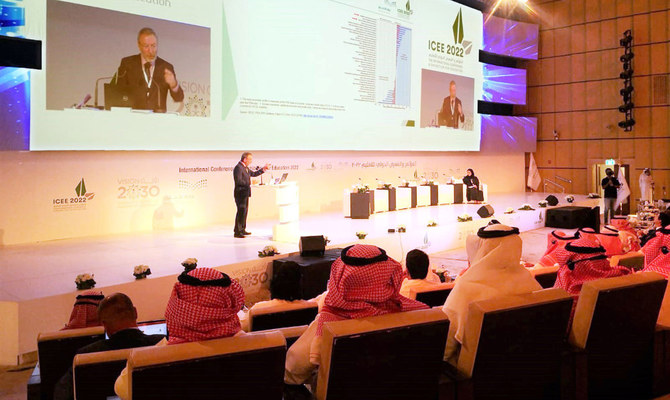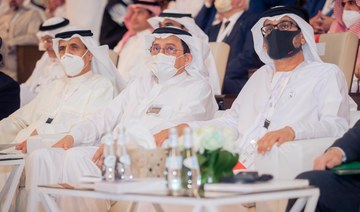RIYADH: International education leaders at a global conference in Riyadh have been cautioned against over-reliance on remote learning and warned that it fails to deliver the same outcomes as in-person teaching.
Nuno Crato, a former Portuguese education minister, told the International Conference and Exhibition for Education 2022 that while technology has a growing role in teaching, so-called e-learning “does not promise the effectiveness of in-person education.”
Delivering a presentation entitled “The Future is Not What It Used to Be,” Crato highlighted changes in the education sector worldwide as a result of COVID-19, and said that “historical transformations” are needed to counter the effects of the pandemic.
He praised Saudi Arabia’s efforts to maintain the educational process through a transition to e-learning, but underlined the importance of focusing on experiences, skills and basics through training and qualifying students in science, reading and mathematics.
Crato described these subjects as “pivotal elements” that affect the knowledge and skills of students in various areas of life.
The OECD’s Programme for International Student Assessment, or PISA, revealed that in many countries, “conditions are not at the required level of positivity,” he said, adding that there is much to be learnt from the practices of nations that have achieved advanced results in the tests.
Online education “does not promise the effectiveness of in-person education and does not give the same results,” Crato said.
E-learning also added to the misconception about children’s preference for electronic tasks, he said, while studies show the internet’s potential to distract children due to the multiplicity of tasks they are required to perform.
“Now, we have an unprecedented body of knowledge that may help us in these debates. We need science, evidence and statistics. Cognitive psychology has witnessed a quantum leap in recent decades,” Crato said.
The economics of education has flourished, with new methods and data, while statistics have blossomed through large-scale studies.
“A new future is in sight,” he said.
Abd Al-Salam Al-Jawfi, an adviser at the Arab Bureau of Education for the Gulf States, said that Saudi Arabia works closely with global organizations in education in order to benefit from international experience and improve the quality of education.
Many global and regional education bodies support the provision of quality and permanent education for all, as well as enhancing coordination, cooperation and integration in education, and providing resources and promoting sustainable development programs for poorer regions.
Al-Jawfi said that global and regional organizations contribute to the growth and improvement of education through a variety of benchmark research studies, programs and initiatives on a regional or international scale, as well as collaborative activities aimed at simplifying and improving education.
Borhene Chakroun, director of the Division for Policies and Lifelong Learning Systems, UNESCO Education Sector, told the Riyadh forum that the global disruption to education caused by the COVID-19 pandemic “is without parallel” and the effects on learning are severe.
“The crisis brought education systems worldwide to a halt, with school closures affecting more than 1.6 billion learners at the pandemic’s peak. The short and long-term consequences of the crisis on education require further investigation, evidence and global dialogue,” he said.
Chakroun highlighted the importance of learning from international and local education advances, such as the Saudi Madrasati platform and other distance learning initiatives around the world.



























